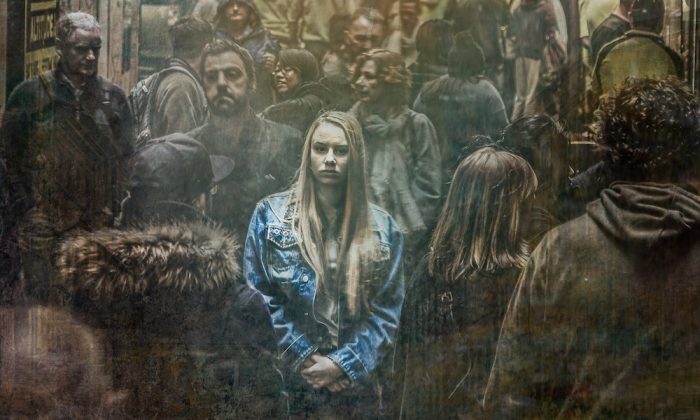It took me a while in this life to work out what I do well and what I don’t.
So, for some negatives:
Well, firstly, I’m an appalling cook. I drive too fast. I swear like a trooper. I’m sometimes impatient (particularly with myself), and I edge toward being self-critical. My sense of direction is awful—navigating from A to B, well, expect me to travel through C and D to get there, often swearing loudly along the way.
Some positives?
I’m creative. I’m consistently open to others and situations. And I learn through my connections/relationships like an overly hungry, dehydrated sponge. I possess strong discerning skills and a heightened sense of intuition. I read people quickly and naturally, with a reasonably high level of accuracy.
In summary, a positive for me is discernment.
So, where am I going with this? (Another negative, I’m easily distracted.)
This discernment allows me to spot denial.
It’s a biggie.
Denial is one of the biggest life blocks, and some of us, well, we got bloody good at it. Knowingly or otherwise.
That’s the thing about denial—some of us get so expert, we don’t even know we’re doing it.
My awesome partner found a brilliant acronym to describe denial at its best:
Don’t
Even
N(k)now
I
Am
Lying
Now, denial, like all things, has its spectrum. We can talk denial as in, “Did you leave the loo seat up again?” “Nah, not me,” to a more serious, “Hey, I know something is seriously wrong here—will you talk to me?” “No, there’s nothing wrong at all—you’ve got me wrong.” Sounds relatively harmless, right?
Wrong. Denial is harmful. It disguises, misleads, avoids, and is a major disconnect—with ourselves, our true potential, our purpose, and others in that it creates dishonesty in our relationships—even if unintentionally or if we’re exercising the best intention in the world.
Denial, to be blunt, is a killer of many, many things. It prolongs pain, sacrifices our capacity for peace, and slowly strangles potential.
My personal experience of denial has been both sides of the coin (i.e., there have been times in my own life when I have purposefully or consciously chosen to deny. The consequence of addressing issues were, at the time, wide-reaching, life-changing, and, if I’m honest, overwhelming.).
I was eventually forced to address these areas and did in fact move on to make dramatic changes, including divorce. So, trust me when I say that I truly understand how effective and reliable a partner denial can be.
I have also been exposed to a relationship where denial was a silent yet consistently present “third wheel.” Denial in this case was expertly practiced and long-established. In fact, I would go so far as to say that denial and I had a bit of an “attention battle” in the early days! Love and patience eventually won through, and I’m pleased to say this ultimately led to more honest, courageous communication.
It became apparent in this situation that the denial was result of deep-rooted trauma.
So, why do we deny in the first place?
Well, denial can come from a place of complete unawareness at a conscious level—those times we have buried stuff so deeply, so conveniently, that we simply can’t see the wood for the trees.
At times like these, we lose focus and our train of thought and instead consider more intently those preferable things in life, enabling us to continue a more immediately desirable course—particularly in the short term.
Avoidance. Now this is where we are more aware of our denial but have consciously chosen to avoid whatever it is we are denying. Every tactic under the sun can be used here, from the seemingly innocent distractions of simply keeping busy/working hard to perhaps more blatantly damaging behaviours, such addiction through alcohol, drugs, or food—essentially, “escape vehicles.”
My experience as a coach suggests that the stronger the aversion to facing the fear, the stronger the reaction—particularly where trauma is involved in some guise.
It is my view that the more impactful the traumatic thought or event, the stronger and more firmly placed the coping mechanism adopted.
Denial unquestionably serves us in so many ways. It can act as both a form of protection and defense. When feelings of fear take over and hijack us—whether a sensation of discomfort or out-and-out terror—denial can be a human, go-to choice for many.
Denial passionately and determinedly fights off acknowledgement and, if left unquestioned or unaltered, can run uninterrupted for years. It disempowers and often creates a sense of internalised confusion, disempowerment, and feeling of loss—in this case, a loss of freedom as our thoughts imprison us daily.
This is turn can lead to anxiety and depression and can even show in more physically witnessed symptoms, such as headaches, stomach upset, or muscular pain.
So, how do we address denial—in either ourselves or others?
It starts with acknowledgement, and acknowledgement often comes through connection with others.
Timing is key.
To quote C.S. Lewis:
“Denial is the shock absorber for the soul. It protects us until we are equipped to cope with reality.”
We look fear in the eye, exactly at the moment we are ready to do so.
There should be no shame associated with denial, since it so often comes down to self-preservation.
To step away from a position of denial often takes tremendous courage.
And to encourage someone else from their position of denial?
Well, my friend, the answer to that is simpler than it may first seem:
Give love, the most powerful and natural antidote to essentially what gives life to denial in the first place—fear.
~









Read 2 comments and reply